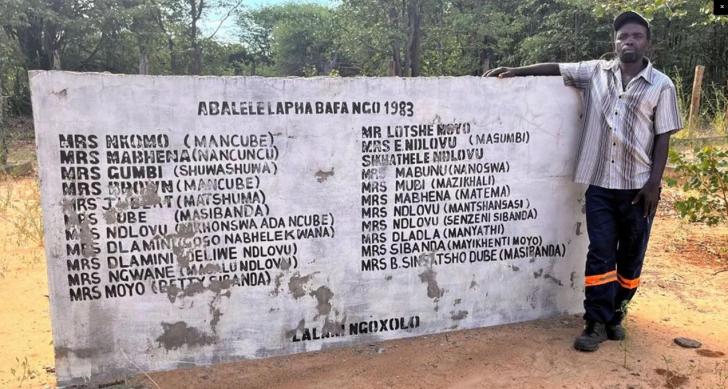News / Local
Gukurahundi hearings turned into 'a farce'
29 Jun 2025 at 18:00hrs |
16 Views

An international researcher and leading authority on state-sponsored atrocities has sharply criticised the ongoing Gukurahundi public hearings, describing the closed-door process as a "final betrayal" of victims seeking justice for the 1980s massacres in Matabeleland.
Dr. Hazel Cameron, an expert in state criminality and transnational organised crime, expressed alarm over the structure and secrecy of the hearings, which began last Thursday under the leadership of traditional chiefs appointed by President Emmerson Mnangagwa.
The hearings are meant to provide closure for survivors of the Gukurahundi atrocities, in which over 20,000 civilians-mainly ethnic Ndebele-were killed by a government-sanctioned military operation during the early years of Zimbabwe's independence.
Despite earlier promises of transparency and public participation, the hearings have been shrouded in secrecy. New guidelines announced by Chiefs Council deputy president Fortune Charumbira stipulated that only one victim may testify at a time before an undisclosed panel, with the media and broader public barred from observing proceedings.
Cameron, who leads Pearl International Insights (PII), an independent research and consultancy institute, condemned the process as deeply flawed and politically compromised.
"The decision to place such a sensitive and historically significant process in the hands of traditional leaders who are both financially and politically beholden to the ruling party is deeply troubling," she said.
"These chiefs are not impartial actors - their close alignment with the government, which was itself a key perpetrator of the atrocities committed during the Gukurahundi period, undermines any credibility the process might have had."
Cameron's research into Gukurahundi includes landmark works such as Operation Gukurahundi: A Policy of Genocidal Rape and Sexual Violence in Zimbabwe, and State Organised Starvation: A Weapon of Extreme Mass Violence in Matabeleland South, 1984. Her investigations have focused not only on the atrocities themselves but also on the complicity of international actors, including the British government.
She also slammed the lack of public oversight.
"The exclusion of independent media, the lack of public transparency, and the restrictions placed upon victims - who are expected to give testimony in isolation, without public oversight or legal safeguards - point not to a genuine process of truth-telling and reconciliation, but rather to a tightly managed exercise in historical revisionism," she warned.
"For those who have waited decades to have their suffering acknowledged, only to face yet another state-controlled mechanism devoid of impartiality, this moment may feel like a final betrayal."
Cameron made the remarks in response to queries from the Mthwakazi Republic Party, a political movement advocating for the rights and recognition of Matabeleland communities.
Despite the challenges, Cameron vowed to continue documenting the atrocities to preserve historical truth and resist state-led attempts at revisionism.
"While the independence of the judiciary in Zimbabwe remains uncertain, I understand the strategic value of attempting to use every available institutional channel to resist this state-led narrative," she said.
The Gukurahundi massacres remain one of Zimbabwe's darkest chapters, and efforts to address them through public hearings have long been mired in political controversy and allegations of insincerity by the government.
Dr. Hazel Cameron, an expert in state criminality and transnational organised crime, expressed alarm over the structure and secrecy of the hearings, which began last Thursday under the leadership of traditional chiefs appointed by President Emmerson Mnangagwa.
The hearings are meant to provide closure for survivors of the Gukurahundi atrocities, in which over 20,000 civilians-mainly ethnic Ndebele-were killed by a government-sanctioned military operation during the early years of Zimbabwe's independence.
Despite earlier promises of transparency and public participation, the hearings have been shrouded in secrecy. New guidelines announced by Chiefs Council deputy president Fortune Charumbira stipulated that only one victim may testify at a time before an undisclosed panel, with the media and broader public barred from observing proceedings.
Cameron, who leads Pearl International Insights (PII), an independent research and consultancy institute, condemned the process as deeply flawed and politically compromised.
"The decision to place such a sensitive and historically significant process in the hands of traditional leaders who are both financially and politically beholden to the ruling party is deeply troubling," she said.
"These chiefs are not impartial actors - their close alignment with the government, which was itself a key perpetrator of the atrocities committed during the Gukurahundi period, undermines any credibility the process might have had."
Cameron's research into Gukurahundi includes landmark works such as Operation Gukurahundi: A Policy of Genocidal Rape and Sexual Violence in Zimbabwe, and State Organised Starvation: A Weapon of Extreme Mass Violence in Matabeleland South, 1984. Her investigations have focused not only on the atrocities themselves but also on the complicity of international actors, including the British government.
She also slammed the lack of public oversight.
"The exclusion of independent media, the lack of public transparency, and the restrictions placed upon victims - who are expected to give testimony in isolation, without public oversight or legal safeguards - point not to a genuine process of truth-telling and reconciliation, but rather to a tightly managed exercise in historical revisionism," she warned.
"For those who have waited decades to have their suffering acknowledged, only to face yet another state-controlled mechanism devoid of impartiality, this moment may feel like a final betrayal."
Cameron made the remarks in response to queries from the Mthwakazi Republic Party, a political movement advocating for the rights and recognition of Matabeleland communities.
Despite the challenges, Cameron vowed to continue documenting the atrocities to preserve historical truth and resist state-led attempts at revisionism.
"While the independence of the judiciary in Zimbabwe remains uncertain, I understand the strategic value of attempting to use every available institutional channel to resist this state-led narrative," she said.
The Gukurahundi massacres remain one of Zimbabwe's darkest chapters, and efforts to address them through public hearings have long been mired in political controversy and allegations of insincerity by the government.
Source - Southern Eye
Join the discussion
Loading comments…


































